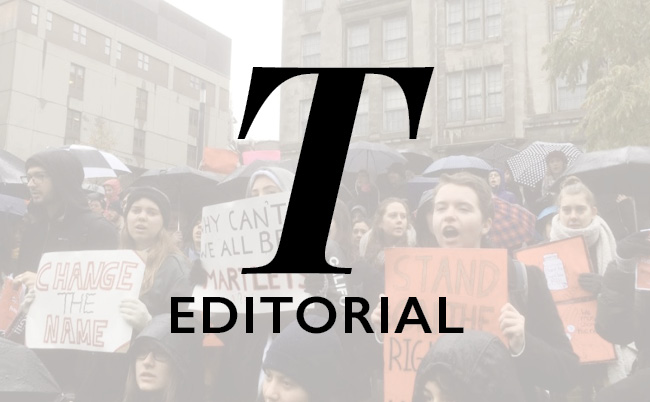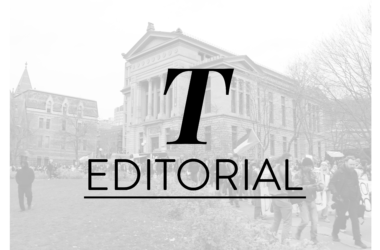Last week, in our Oct. 29 issue, The McGill Tribune published an open letter written by Students’ Society of McGill University (SSMU) Indigenous Affairs Commissioner Tomas Jirousek. In the letter, Jirousek explains the events that led him and other Indigenous student leaders to ask for the resignation of SSMU Vice-President (VP) Internal, Sanchi Bhalla. In addition, Jirousek’s letter describes the institutional failures of SSMU to provide adequate allyship to Indigenous students. The letter closes by outlining a three-step plan for increasing the autonomy, support, and mobility Indigenous students have when advocating for themselves on campus. The steps include increased fiscal autonomy, giving the Indigenous Affairs Commissioner role independence from the SSMU executive, and greater resources to facilitate rapid mobilization. Following the letter’s release, Jirousek posted screenshots of hateful comments he had received in response to his activism in a Facebook post on Oct. 31. Some of the comments were from a recent r/mcgill Reddit post made in reference to Jirousek’s most recent open letter. Without exception, the comments present in Jirousek’s post are staunch examples of targeted racism and invalidate the work he has done as an Indigenous activist. In light of such comments, both SSMU and the McGill student body are falling short of their professional and moral obligations to support and provide allyship to Indigenous students on campus, especially Jirousek.
The Tribune condemns the comments and responses shown in Jirousek’s Facebook post, as well as the hateful sentiments that they stem from. Further, the Tribune fully endorses the points and messages communicated by Jirousek in his most recent open letter. It is disappointing that following both the publication of Jirousek’s open letter and his Facebook post showing the racist rhetoric he continues to endure—including comments calling him aggressive and accusing him of having a ‘victimhood mentality’—SSMU has refrained from making any kind of official statement in response. While VP University Affairs Madeline Wilson has made a Facebook post on the SSMU University Affairs page supporting Jirousek, this is far from constituting an official response made by the entirety of SSMU.
“The McGill Tribune condemns the comments and responses shown in Jirousek’s Facebook post, as well as the hateful sentiments that they stem from. Further, the Tribune fully endorses the points and messages communicated by Jirousek in his most recent open letter.”
The initial call by Indigenous student leaders for Bhalla’s resignation is a complex situation, and the SSMU executive should take their time in deciding how to proceed further. However, a statement of support and solidarity for Jirousek and Indigenous students as a whole does not require that SSMU resolve the bureaucratic tangle involving VP Bhalla. A statement saying that SSMU have read, recognized, and are considering the propositions that Jirousek made in his open letter would also be beneficial. SSMU’s institutional silence on this issue is deafening and the message it sends about the priorities of the current executive body is disheartening.
McGill’s student body also has responsibilities when it comes to providing allyship to Indigenous students. Allyship incorporates many different behaviors and practices, but its purpose as a whole must be focused on more than mere marginal changes for Indigenous students. One of Jirousek’s calls-to-action in his open letter was to provide full financial autonomy for Indigenous students advocating for themselves, instead of a fee through SSMU. The Motion Regarding Creation of Indigenous Equity Fund and Fee was submitted on Sept. 26, and will be put to a student vote from Nov. 12-15. The Tribune strongly encourages students to vote ‘yes’ to the fee.
It is also incumbent upon everyone in the McGill community to call out the type of language directed at Jirousek for what it is: Racist and unacceptable. If students feel uncomfortable engaging with toxic individuals online, there are less direct methods of countering hate speech such as deplatforming users, reporting them, and flagging hateful comments. While online vigilance is necessary, Indigenous-focused allyship includes much more than intolerance to internet hate speech.
McGill University is built upon land that was stolen from the Haudenosaunee and Anishinabeg nations by European colonizers. Allyship with Indigenous students is crucial; this involves educating oneself about the history of land which we currently inhabit, recognizing the genocidal practices and human rights violations that built up areas like Montreal, and understanding the ways in which this history systematically manifests itself in the present day. However, the responsibility to educate does not lay with Indigenous student leaders or activists. Rather, it is the responsibility of those in positions of privilege to educate themselves.
If students are able to help amplify the voices of marginalized groups and recognize the ways in which their own privilege functions on an everyday basis, this will foster better allyship for Indigenous students. This means participating in Indigenous-led protests, calling out your peers if they say something insensitive, and likely, recognizing aspects of one’s own lived experience which may be uncomfortable, including privilege and benefits one receives as a result of Indigenous oppression. Being a good ally is not necessarily easy, but it is absolutely vital. The Tribune also urges the SSMU executive to use this experience as an opportunity for learning and growth, and to use their position of power to help create meaningful change for Indigenous students.






Maybe people should stop using buzzwords. They are an insider thing, and that tends to exclude those who don’t know the meaning. “Ally” is very recent, but I’d argue that it’s defining a relationship. People rushing to “help”, they can be loud but often may not know that much and too often speak rather than give opportunity to those directly affected.
I keep thinking of a 1983 demonstration against racism in the taxi industry. It was organized by black people, and most there were black. But one white guy was loudest, complete with a clenched fist.
More recently I’ve seen people react, but it’s to the stories that slip out into mainstream. There are all kinds of other concerns to native people. And sometimes even it sounds like the writer is more anti-government than really concerned with native people. I’ve seen outrage over the idea of smallpox infested blankets, but too many people died from smallpox just by contact with Europeans. I suspect most famioies lost members to the disease, and it damaged a thriving population, and by the time settlers spread out, they saw a very different continent.
” Allies” need to be looking deeper, not vandalizing statues, but getting a much deeper picture. They need to be asking why stories or columns aren’t being written by native people. They need to question why editorials, even positive ones, afen’t from a native perspective.
“Ally” is about European’s place in things, not some cool way for people to rush out and act.
I am no ally. I am a distant cousin with ancestors in Red River 150 years ago. It’s family history that changed me. That is one way to do it, imagine you are related. Where does it take you, how does it change how you view things?